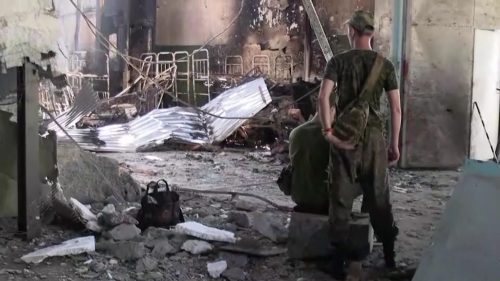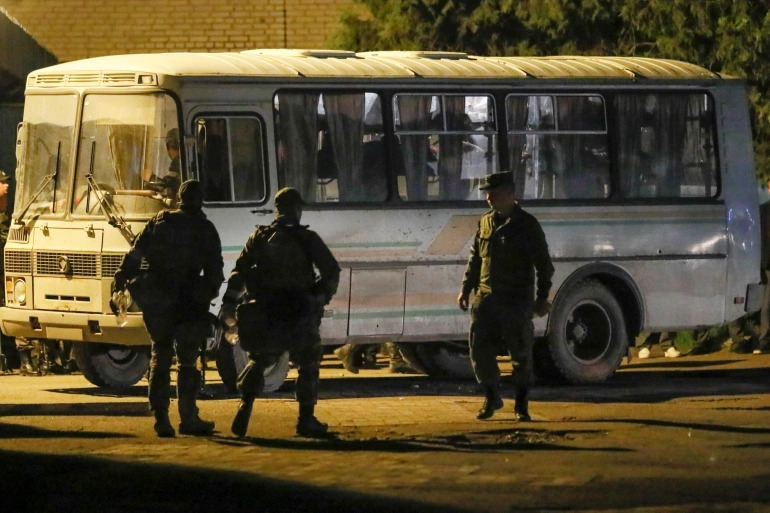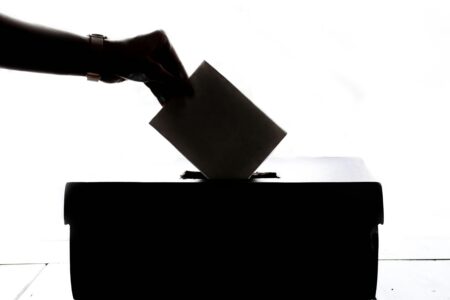Liam Hunt, Special Collaboration
UKRAINE – On July 29, Russian-backed separatists detonated explosives that killed 53 Ukrainian prisoners of war (POWs) in the Russian-operated Olenivka prison colony. Olena’s husband, Andrej, was lucky to escape with his life.
A member of the 56th Motorized Infantry Brigade, Andrej was captured in Mariupol on March 26 and was presumed dead until Olena received an unexpected phone call the day after the Olenivka massacre.
In October, Olena, 40, sat across from me in a hotel lobby a stone’s throw from Maidan — a downtown Kyivan square famous for being the site of several pro-democracy uprisings. Olena was staging an uprising of her own, fighting tirelessly for her husband’s freedom, as well as the freedom of thousands of Ukrainians whose fundamental rights are deprived every day by Russian captors.
With the help of a fellow activist—Tanya, 30—Olena described her relief when she heard her husband’s voice on the phone. “I was the happiest person, because I heard the voice of my beloved,” she told me. Russian captors allowed Andrej to make one brief proof-of-life phone call—a privilege seldom afforded to Ukrainian POWs.
“Thank God,” she said, “to whom I prayed every second that he would survive.”

After her husband went missing, Olena founded Polygon 56, a public advocacy organization that works with state agencies to facilitate the exchange of captive Ukrainian soldiers. The organization’s motto is “everyone for everyone”, reflecting Polygon’s mission to bring back every member of the 56th Brigade and all other captured units of the Ukrainian Armed Forces. Since March, she has worked endlessly to raise awareness of the brutal and inhumane conditions to which POWs are subjected.
Although negotiations are handled by the Main Directorate of Intelligence (GUR), Polygon 56 serves as a vital informant for the state. They relay firsthand intelligence to negotiators who otherwise have limited knowledge of prison conditions in Russia and Ukrainian POWs’ whereabouts and health status. Thanks to Polygon’s work, Ukrainian representatives have greater negotiating power to repatriate captured soldiers and the family members who are often illegally detained with them.
Like Olena, Tanya also has a personal stake in this matter.

Tanya’s father, Dima, was captured in April in the now-liberated city of Izyum. Her last communication with him was on April 19, when Dima video-called her that morning to inform her that fierce combat had broken out and that he may not be able to call her again.
Tanya does not know where he is being held, or whether he is even alive. She knows that some prisoners of his brigade survived only because of their fleeting appearances in the background of Russian newscasts—something which itself constitutes a war crime according to Human Rights Watch, as they subject prisoners to unjust public curiosity.
Systemic Roadblocks
The International Committee of the Red Cross (ICRC) has repeatedly sought full access to the Olenivka colony only to have their attempts refused. More recently, they failed to even show up to pre-inspection meetings with Ukrainian negotiators. Since the beginning of the full-scale invasion, the ICRC has faced criticism for playing both sides of the field and failing to respond to the war’s humanitarian crisis with the urgency it deserves—their efforts frustrated either by a lack of preparation or a blithe timidity in the face of Russian institutional resistance.
To date, the ICRC has refrained from confirming that Russian authorities have failed to grant them permits to visit the colonies, and have instead cloaked their complaints in equivocal language. Last month, a Red Cross spokesperson told the press that their organization “need[s] practical arrangements with the parties,” without clarifying which parties were at fault.
The Canadian Red Cross has yet to apply any public pressure on its parent organization to decisively move forward with its obligation to visit Olenivka.
Disillusioned by the ICRC’s passivity, Polygon sent four of its own delegations to Olenivka in the aftermath of the July prison massacre. They spoke to the head of the prison colony each time but were denied visitation on dubious grounds. “[We] were refused for reasons like a wrong color of bus,” Olena said. “Or that we had the wrong driver.”
Polygon’s campaign to enter the Olenivka prison colony hit a dead end in September after the organization launched a formal appeal to Yuriy Sirovatko, the then-Minister of Justice of Donetsk People’s Republic (a Russian-backed separatist state). The DPR’s Commissioner for Human Rights confirmed receipt of their petition via a signed letter dated September 12, which stated that the Ministry of Justice would respond to their proposal in short order. Following the annexation of the DPR by the Russian Federation on September 30, Polygon has since lost contact with local authorities and their appeal has been effectively dissolved.

Legal Implications
To its credit, the ICRC made two cursory visits to the Olenivka prison colony in May during which they were given limited access to a small number of prisoners. As the visits were closely supervised by Russian forces, they failed to meet ICRC standards and did not constitute a legitimate inspection exercise under Section 1, Article 126 of the Third Geneva Convention.
This was confirmed by Professor Frédéric Mégret, co-director of the Centre for Human Rights and Legal Pluralism at McGill University and one of Canada’s foremost experts on international humanitarian law. “The behavior described would certainly violate the Third Geneva Convention,” he told me. “At the very least, the ICRC should be granted access to all prisoners, not just a few hundred as has been the case so far.”
Polygon’s position is that the Red Cross is not doing enough to fulfill its mandate and cannot be taken as an authority on the conditions of Ukrainian captives in the DPR. This view is echoed by the Association of Families of Defenders of Azovstal, a separate POW advocacy group, which has openly criticized the ICRC in the Ukrainian press for its perceived inaction.
Firsthand Accounts of War Crimes
In the absence of ICRC supervision, Polygon’s work is all the more important: only statements passed directly from prisoners to their relatives reflect the real circumstances of their imprisonment. As one of the few Ukrainian organizations that hear statements from imprisoned soldiers, Polygon is uniquely knowledgeable of prison conditions behind the fog of war.
“[Ukrainian POWs] are subjected to beatings and other horrible tortures,” said Tanya. “They are tortured with electric shocks, regardless of whether you are a woman or a man.”
“In Olenivka, they had four shifts [of guards],” Olena continued. “One of the shifts was vicious, which used everything to beat up prisoners, from rubber sticks to God knows what. They were breaking prisoners’ ribs and throwing them into pits.”
Such brutal disciplinary techniques are the same as those used in Russia’s infamous Chernokozovo prison camp, where “torture pits” were implemented to demoralize prisoners during the First Chechen War. Russia’s civilian prisons also have a long history of imposing cruel and inhumane punishments on Russian citizens, including punitive beatings with blunt objects such as wooden stools and hammers. For the Russian Federation to punish its own in such a way suggests even more pervasive mistreatment of its enemies.
“The camps where the prisoners are kept are not heated, [and] many of the prisoners have diseases, [for which] medicines and necessary treatments are not provided to them […] not just insufficient medical treatment but no medical treatment whatsoever—none at all,” said Olena. Most of this information was given to her when she last spoke to her husband, on July 30.
According to Olena, captors also neglect their prisoners’ personal hygiene and dietary needs. “They are wearing the same clothes in which they were taken prisoner six months ago, which is a completely unsanitary condition […] There is neither enough food nor water. They are given half a liter a day, a quarter chunk of bread, a serving of rotting cabbage, and a plate of porridge shared by up to ten prisoners.”
To deny a prisoner their right to medical care violates Article 113 of the Third Geneva Convention, as well as Articles 13 through 16 which hold that all prisoners must be treated “humanely at all times” and provided protection against “acts of violence or intimidation” and “measures of reprisal”.
Statements made by Tanya and Olena appear to corroborate the official position of the Ukrainian Armed Forces, who maintain that Russia destroyed the Olenivka penal colony to conceal evidence of war crimes committed in the DPR.
“The allegations are shocking,” wrote law Professor Frédéric Mégret. “Some of the violence against Ukrainian POWs seems vengeful in nature […] It is strenuously prohibited to beat POWs who are supposed to be treated humanely and with respect at all times. It is important to stress that under the laws of war combatants are simply fighting for their state […] under no circumstances can the families of combatants be dragged with them into detention.”
Yet, many of those detained in Russian penal colonies are not combatants themselves. In fact, Olena and Tanya estimate that the majority of those in Russian detention are civilians—comprising spouses, parents, siblings, and even children of Ukrainian soldiers.
I asked Olena how many children have been kidnapped by Russian forces.
“A lot,” she replied. “I can’t even tell how many children were kidnapped and deported, I can’t even imagine how many. It’s a huge number of families.” Olena has also heard accounts of, in some instances, ransoms being paid to release children from the hands of their captors. “A grandmother [in Mariupol] had to pay thousands of euros to get a four-year-old girl out of captivity.”
The conditions at Olenivka, although severe, are preferable to certain other Russian prison camps. Both Tanya and Olena claim that the Taganrog prison, in Russia’s Rostov oblast, has hosted a litany of war crimes against prisoners indiscriminate of their gender.
These crimes include physical abuse, sexual assaults, and rape, according to testimony provided by recently exchanged female prisoners. Female prisoners were allegedly beaten and disgraced by violent female overseers and had their heads shaved in an act of deliberate humiliation. Yet some colonies are operated with relative leniency, such as Sukhodilska prison in Russian-controlled Luhansk. In Sukhodilska, mistreatment is forbidden and, to Olena’s knowledge, no beatings of prisoners have taken place.
Less is known, however, about penal colonies in the Kursk and Bryansk regions of the Russian mainland, and the Gorlovka colony in occupied Donetsk. Olena suspects her husband, alongside many Mariupol defenders, may have been transferred to one of these prisons after the Olenivka explosion.
Frustrations Mount
Thousands of Ukrainian families are demanding answers from local authorities who have been slow to provide them. In late October, I exchanged emails with Kote, 26, from Mariupol, whose husband was captured alongside other Azovstal defenders. She explained at length the immense frustration felt by her and other POW relatives who feel they are being misled by Ukrainian officials and state negotiators.
“The Ukrainian authorities have forgotten about many of our captured guys,” she wrote. “No matter how they justify themselves that they are doing everything possible to return them home, no one has received any information from them for many months. Many have heard in interviews at the [public roundtables] the lie that all the prisoners were exchanged. At the moment, the families of the prisoners are trying to hold peaceful demonstrations so that they can be heard.”
However, Olena maintains that Kote’s grievances are the result of a misunderstanding. Comprehensive personal privacy laws, Olena says, prevent the state from providing information related to individual POWs without their consent—leaving many Ukrainian POW families feeling left behind. This, however, is a natural consequence of a society that adheres to the rule of law, something that Olena thinks distinguishes Ukraine from its Russian counterparts.
“Our government is making every effort to release civilians and military personnel,” Olena wrote me. “There is a law on personal data [disemination] … [so] a lot of information cannot be given to us. Therefore, many people think that they are being deceived. The main thing is not to harm our prisoners who are there, and to return everyone home.”

Limited Progress
On October 17, the war’s first all-women prisoner exchange took place, resulting in the repatriation of 108 Ukrainian servicewomen and female civilians. As a liaison between prisoners and state mediators, Polygon played a critical role in the exchange. Upon returning home, more evidence of mistreatment emerged from the survivors.
“They told us they would shoot us like dogs,” recounted Hanna, one of the recently exchanged Ukrainian servicewomen. Among those exchanged were innocent civilians imprisoned even before the full-scale invasion, taken as prisoners of conscience for their “extremely pro-Ukrainian position[s]”.
Three more prisoner swaps have since occurred—the first on October 29, second on November 3, and third on November 11—which, combined, returned 204 Ukrainian men. In each case, the majority of those brought home were Azovstal defenders captured in Mariupol.
Andrej and Dima, however, were not counted among them.
Without humanitarian oversight from the ICRC, the only way to ensure the survival of Ukrainian POWs is to bring them home. Prisoner exchanges are the only proven means for doing that. Olena and Tanya are calling on the international community to help free Andrej, Dima, and the 17,000 of their captured brothers and sisters-in-arms who are subjected to daily torture and indignities. They ask international allies, including lawyers, human rights organizers, and veterans associations, to contact Polygon 56 to join the fight for Ukraine’s liberators.
Against the backdrop of Maidan, Tanya and Olena fight for something more than their own. Ukraine’s is a fight for liberation, theirs is a fight for freedom of another kind.





